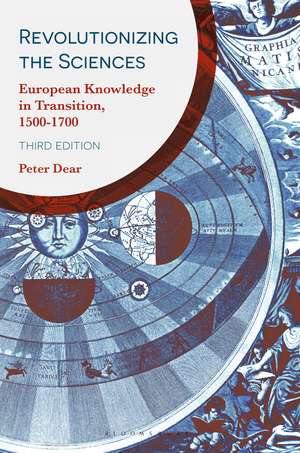Revolutionizing the Sciences: European Knowledge in Transition, 1500-1700
Autor Peter Dearen Limba Engleză Paperback – 2 dec 2018
| Toate formatele și edițiile | Preț | Express |
|---|---|---|
| Paperback (1) | 184.59 lei 43-57 zile | |
| Bloomsbury Publishing – 2 dec 2018 | 184.59 lei 43-57 zile | |
| Hardback (1) | 538.77 lei 22-36 zile | |
| Bloomsbury Publishing – 4 feb 2019 | 538.77 lei 22-36 zile |
Preț: 184.59 lei
Preț vechi: 227.48 lei
-19% Nou
Puncte Express: 277
Preț estimativ în valută:
35.32€ • 36.97$ • 29.40£
35.32€ • 36.97$ • 29.40£
Carte tipărită la comandă
Livrare economică 31 martie-14 aprilie
Preluare comenzi: 021 569.72.76
Specificații
ISBN-13: 9781352003130
ISBN-10: 1352003139
Pagini: 220
Dimensiuni: 155 x 235 x 13 mm
Greutate: 0.32 kg
Ediția:3rd ed. 2019
Editura: Bloomsbury Publishing
Colecția Bloomsbury Academic
Locul publicării:London, United Kingdom
ISBN-10: 1352003139
Pagini: 220
Dimensiuni: 155 x 235 x 13 mm
Greutate: 0.32 kg
Ediția:3rd ed. 2019
Editura: Bloomsbury Publishing
Colecția Bloomsbury Academic
Locul publicării:London, United Kingdom
Caracteristici
Features a rich variety of illustrations, a glossary of major terms and a detailed list of further reading
Notă biografică
PETER DEAR is Professor of History and of Science and Technology Studies, Cornell University, USA.
Cuprins
Preface Introduction: Natural Philosophy and Instrumentality 'What Was Worth Knowing' in 1500 Humanism and Ancient Wisdom: How to Learn Things in the Sixteenth Century Paracelsus and Bacon: Philosophy as Practical Knowledge Mathematical Practitioners and Mathematical Philosophers Mechanism and Corpuscles: Descartes Builds a Universe Extra-Curricular Activities: New Places for Natural Knowledge Experiment: How to Learn Things about Nature in the Seventeenth Century Cartesians and Newtonians Conclusion: What Was Worth Knowing by the Eighteenth Century? Notes and References Documentation and Further Reading Dramatis Personae Glossary of Major Terms Index.
Recenzii
This book is required reading for students and teachers of science in early modern Europe. With clear prose and a strong narrative, Dear guides the reader through the methodological and metaphysical upheavals that defined early modern science.
Revolutionizing the Sciences is a highly-engaging and readable history that both explains traditional interpretations of the Scientific Revolution and offers challenging and innovative revisions to those accounts. The book is a critical starting-point for understanding the many fascinating debates around the origins of modern science going on today.
Revolutionizing the Sciences is a highly-engaging and readable history that both explains traditional interpretations of the Scientific Revolution and offers challenging and innovative revisions to those accounts. The book is a critical starting-point for understanding the many fascinating debates around the origins of modern science going on today.
